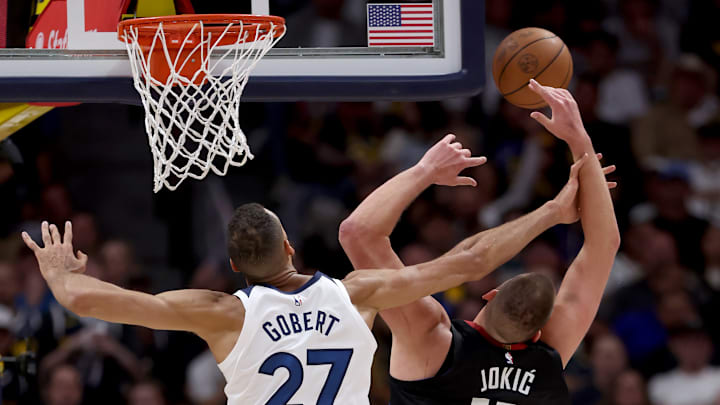The Defensive Player of the Year is no stranger to ridicule. Minnesota Timberwolves center Rudy Gobert's game is constantly under debate. Is he a good player? Does he make a difference in the postseason? Can he defend multiple positions? Numerous questions persist regarding the big man's impact.
The Wolves' failure to adequately defend the Denver Nuggets in the past three games has caused the aforementioned questions to become pertinent. After stifling Denver's offensive attack in Games 1 and 2, the Nuggets have prevailed—averaging 114.7 points in games three through five.
Nuggets' head coach Mike Malone has pivoted excellently, shifting how Denver's offense operates. Instead of using power forward Aaron Gordon in the dunker spot and as a spot-up shooter, he's utilized the high-flying forward as an initiator. This is where Gobert comes into the equation.
The star big man has primarily matched up with Gordon throughout the series. Gobert has spent 28 minutes defending the Nuggets forward. In this time, he's allowed Gordon to score 28 points, dish out six assists, and knock down 11-of-16 looks.
Gobert has also defended superstar Nikola Jokic—albeit to a lesser extent. In his time defending the MVP, he's allowed Jokic to score 48 points while knocking down 51.4 percent of his field goal attempts.
The reasoning behind Gobert matching up with Gordon is to allow for the French big man to anchor the defense. Rather than sticking to Jokic, Gobert can provide help defense on the three-time MVP. Moreover, this has been Gobert's role for years. He's matched up with numerous premier big men, but he's also the best help defender in all of basketball—so it makes sense.
The initial strategy where Karl-Anthony Towns matches up with Jokic and Gobert defends Gordon worked perfectly throughout the first two contests. However, the scheme change has hurt the Wolves and Gobert has received his fair share of flack.
“Gobert was terrible!!”
— Phil Mackey 🎙 (@PhilMackey) May 15, 2024
pic.twitter.com/CK6dzjVWBL
On a deeper level, when Gobert does defend Jokic, he does a fine job. When assessing Jokic's Game 5 performance, there's no question, he dominated. The Serbian big man used a combination of brute force and dizzying moves to score all around the basket. It didn't matter who defended him, Jokic would score.
No matter who defends Jokic, they're in for a long night. The Nuggets star is the biggest mismatch in the NBA. He's strong as an ox, incredibly intelligent, and has an obscenely soft touch. There's not a perfect matchup for Jokic to be found anywhere in the world.
Is there such thing as a Jokic stopper? pic.twitter.com/pWy0eJ8UEA
— Todd Whitehead (@CrumpledJumper) May 15, 2024
The Gobert ridicule isn't flat-out wrong, but it's certainly not warranted. Sure, shots can willfully be taken at the supposed best defender in the league. It's a common theme throughout social media to berate Gobert. However, the Wolves defensive anchor isn't to blame for Minnesota's defensive decline.
There isn't a single solution to the Timberwolves' defensive woes. Substituting Gobert out of the game may help in a pinch, but doing so allows Malone and the Nuggets the upper hand. Without Gobert in the fold, the Wolves severely lack rim protection. In fact, Minnesota's net rating is 12.8 points better with the French big man on the floor thus far.
We'll likely see Minnesota use Gobert as Jokic's primary defender more often in Game 6. When Denver uses Jokic as a pick-and-roll ball handler, Gobert will be put in a precarious situation—evidently needing a hard hedge from the screener's defender. Besides the initiating forefront, the matchups should align to jettison Denver's innovative offensive scheme.
If the Nuggets' offense begins to set the Wolves' defense ablaze once again, Towns or Mike Conley (if he's cleared for action) may have to take a back seat to allow for Nickeil Alexander-Walker to soak up a heavy amount of time.
